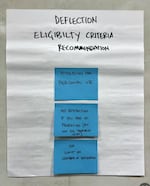Nathan Vasquez won’t take office as Multnomah County’s district attorney until next year, but he’s already managed to have a significant effect on the county’s new drug enforcement policy.
An agreement among public safety officials was upended late last month when Vasquez said behind closed doors that he opposed the approach law enforcement leaders had already unanimously signed on to, according to documents OPB obtained through a public records request.

Multnomah County District Attorney-elect Nathan Vasquez takes office next year.
Multnomah County District Attorney's Office
The county’s plan called for allowing people facing a misdemeanor drug possession charge to have an unlimited number of opportunities to “deflect” outside the criminal justice system, rather than face penalties such as jail. Deflection programs are collaborations between law enforcement and behavioral health entities to create pathways to treatment outside the criminal justice system for people with substance use disorders.
During a meeting on June 26 with many of those same public safety leaders, Vasquez said that once sworn in officially as Multnomah County’s DA, he would criminally prosecute a person with drug possession after just one deflection, according to the emails.
“I do not believe this program can succeed and will likely lose the trust of the community without accountability and meaningful engagement in treatment as the cornerstones of this plan,” Vasquez wrote in an email the following day.
Oregon counties have spent months scrambling to set up entirely new processes to keep drug users out of the criminal justice system after lawmakers ended the state’s drug decriminalization experiment this year.
Under Oregon’s new drug laws, counties can opt to deflect people away from the justice system if they’re facing misdemeanor drug possession charges, sending them instead to treatment programs. The statute gives counties latitude in defining what deflection looks like, including how many opportunities someone should have.
Oregon’s new law is estimated to result in 1,333 new convictions statewide every year among people whose only criminal charge is possessing a small amount of an illicit drug such as fentanyl, heroin, methamphetamine or cocaine, according to the Oregon Criminal Justice Commission. The estimate suggests a relatively small number of people would be eligible for deflection, with more facing additional criminal charges.
Counties submitted applications to the state detailing those plans by July 1 to secure grant funding for the deflection programs under House Bill 4002. That’s been a tough deadline for many to meet due to the level of coordination needed between law enforcement agencies, behavioral health providers, courts and nonprofits. Each county is approaching its plan differently. And some counties aren’t participating at all.
Records show the process has been particularly divisive in Multnomah County.
The county’s current proposal would roll out a three-phase plan that starts in September with an “alternative to arrest” program connecting individuals “to a behavioral health pathway and recovery.”
For some, that will mean being taken by law enforcement to the Treatment Readiness Drop-off Center, a facility on Southeast Sandy Boulevard recently leased by the county for $216,000 annually. That treatment center, according to budget estimates obtained by OPB, will cost more than $2.77 million to operate according to the initial estimate, accounting for costs related to transportation to the facility, 24/7 security, staffing, food and supplies.
The longer-term aspects of the plan, however, are still taking shape as county leaders debate how much they want to depart from the decriminalized system they’ve been tasked with replacing.
In an email to OPB on July 3, county officials said that people found with a “personal amount of drugs” will “not have unlimited chances to be deflected,” and that the number of deflections is currently under discussion by the leadership team, which includes county officials, law enforcement and behavior health advocates.
The debate over deflection
Records obtained by OPB indicate Multnomah County officials were on course to adopt a policy with no limits on the number of times a person could deflect out of the justice system until a meeting in late June, when District Attorney-elect Nathan Vasquez raised concerns about the leniency of the program.

An email from Abbey Stamp, executive director of the county’s local public safety coordinating council, summarizing a May 2 meeting, noted “unanimous recommendations” for “no limit on number of deflections.” That meeting included Multnomah County Sheriff Nicole Morrisey O’Donnell, current District Attorney Mike Schmidt, Portland Police Chief Bob Day and Gresham Police Chief Travis Gullberg.

A recommendation of deflection eligibility criteria was attached to an email exchange between Abbey Stamp, executive director of the county’s local public safety coordinating council, and a number of Multnomah County officials on May 9, 2024. The email was then forwarded to DA-elect Nathan Vasquez on June 25, 2024, part of emailed materials obtained by OPB via an open records request.
Obtained via public records request / OPB
Weeks later that changed, following a bruising race for district attorney in which Schmidt lost reelection to Vasquez, a prosecutor in his office.
During the meeting on June 26, Vasquez said he supported only one deflection, the emails state.
“In my view, the legitimacy and success of this program must have true accountability measures and meaningful treatment engagement,” Vasquez wrote in an email to the leadership group the following day.
“To that end, there must be limits on eligibility based on continued prohibited behavior (ongoing open-air drug use for example) and there must be meaningful engagement in available treatment to call the deflection a success.”

Schmidt was not at the June 26 meeting. His policy adviser, Aaron Knott, attended and wrote to his boss afterward.
“Basically, the room has pivoted significantly on whether there should be a cap on the number of deflections — the consensus is ‘yes’ but no number was agreed on,” Knott wrote Schmidt. “Vasquez suggested one, others suggested three and five.”
Schmidt replied to Knott in writing: “One is absurd. I think much more than that is academic,” and noted it would be “rare” for a person to get arrested multiple times for possession alone.
In an email June 28, public defender Grant Hartley asserted that requiring meaningful engagement for deflection, as mentioned by Vasquez, would create a “bureaucratic nightmare” for the county and “risks losing buy-in from treatment providers and peer organizations.”
“By only requiring the warm hand-off and a screening, the deflection can occur immediately. It does not require reporting back to law enforcement regarding a future appointment or obligation,” Hartley, director of the Multnomah County Metropolitan Public Defender office, said in the email.
County health officials and mental health advocates emailed in response that they agreed with Hartley.
Top law enforcement officers in the county, meanwhile, echoed Vasquez’s call to increase accountability for people offered deflection.
Sheriff Morrisey O’Donnell told the group they needed to require more of drug users than just a screening.
“A successful deflection program should include requiring further engagement in available treatment resources,” Morrisey O’Donnell wrote in a June 28 email, which was sent around the same time as Hartley’s. “I want to ensure that we are not going down a path of defining success as only changing the door people walk through, without a commitment to providing an array of treatment options and for individuals to actively participate in those services that are offered.”
She added: “From a public safety perspective, unlimited deflection is not a viable option,” noting Vasquez’s proposal of one deflection, and asked to “discuss an appropriate limit of deflections in a future meeting.”
Days later, Chief Day responded to the group with another email saying: “I do not believe jail is the answer for addiction treatment but there is some evidence that accountability and individual responsibility matters. Unfortunately, either perspective is not very beneficial when there are not enough services for those inside or outside the criminal justice system.”
A system under stress
As public officials work to iron out the details, the reality on the ground suggests that deflection programs will face the same challenges as the previous decriminalized system did: too few treatment opportunities for the people kept out of the criminal justice system, and too few public defenders for those who do face prosecution within it.
“Every single day there are people in drug courts that are assessed and referred to different various levels of treatment — and it’s not available to them, it does not exist,” Schmidt said in an interview with OPB. “Our deflection is going to face some of the same realities. We want to get people connected to these treatment resources, but right now, as it stands, there simply aren’t enough.”
He also noted that the county is having trouble finding public defenders to represent defendants in drug dealing cases, let alone for lower-level offenses like possession.
Knott, Schmidt’s adviser, said in a public safety meeting June 24 that of the 67 most recent dealing cases referred to their office, 45 have been “postponed or dismissed” due to a lack of public defenders. Knott said the DA’s office has only been able to do work on about 12 of them due to the shortage.
“I would submit that is an unacceptable percentage,” Knott said.